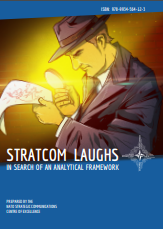CONCLUSIONS AND RECOMMENDATIONS
CONCLUSIONS AND RECOMMENDATIONS
Author(s): Ivars Austers, Jurģis Škilters, Žaneta Ozoliņa
Subject(s): Politics, Psychology, Media studies, Geography, Regional studies, Communication studies, Social psychology and group interaction, Methodology and research technology, Evaluation research, Transformation Period (1990 - 2010), Present Times (2010 - today)
Published by: NATO Strategic Communications Centre of Excellence
Keywords: laugh; humour; communication; strategic communication; politics; media; psychology; tools; conclusions; recommendations; Russia; Ukraine; KVN;
Summary/Abstract: Humour is a universal concept that has been analysed within different disciplines of social sciences. The study presented by a group of scholars aims to elaborate a multidisciplinary methodological framework that can be applied in the analysis of humour, particularly if researchers or practitioners are confronted with very large sets of data, as well as to the construction of humorous messages for strategic communication purposes. The methodological framework is not a template to follow when generating humorous stories or jokes, but rather a collection of the most relevant attributes of humour that can be combined in different groupings to achieve the initial strategic goal. In order to test the functioning of the methodological framework and identify its strengths and weaknesses, three case studies were conducted. The first case study, on the discrediting of Western political leaders in late-night shows broadcast by the central Russian TV channels, identified humour as a massive propaganda tool aimed at national and international audiences. The second case study dealt with KVN (Klub Vesyeliykh i Nakhodchivikh) which is a TV-show and competition broadcast since the early 1970s. While the third case, focusing on the use of humour by the Ukrainian media, provides rich evidence on humour as a tool of counter-propaganda. The Ukrainian case also serves as an example of the role of humour in a situation of on-going information warfare. The following conclusions and recommendations were identified from the analyses of the three case studies.
Book: STRATCOM LAUGHS - IN SEARCH OF AN ANALYTICAL FRAMEWORK
- Page Range: 140-155
- Page Count: 16
- Publication Year: 2017
- Language: English
- Content File-PDF

